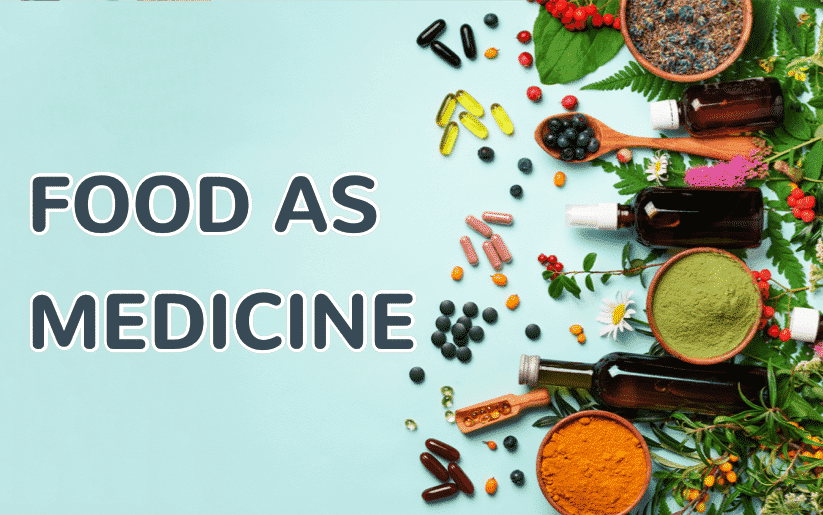There’s no question that the foods we eat affect not only our weight but also the way we feel. Thankfully, many of us are making an effort to shift away from the highly-processed, low variety diet that has been the norm in the US for the past several decades.
Although fast food is tasty and convenient, it clearly compromises our overall health. Thinking of food as medicine is a great way to take a proactive approach to improved overall health and wellbeing.
Although food cannot wholly replace medicine, there are many diseases that can be prevented, improved, or even cured by changing our diet and lifestyle. Let’s take a look at which foods can have a medicinal effect on the body and how they can be used for better health and healing.
How Nutritious Food Protects Your Body from Illness
The vitamins, minerals, and other nutrients in the foods we eat nourish our bodies and protect them from illness. When we eat nutritious, whole foods they contain unique chemical compounds that can’t be duplicated in any other way. The typical American diet emphasizes fast, convenient food that has been highly processed, with few whole grains or fresh fruits and vegetables. This way of eating is deficient in the essential nutrients that prevent disease.
- Vitamins and Minerals: When your body doesn’t get enough vitamin D, vitamin C, or folate, your heart, and immune system suffer, and you’re at a higher risk of getting certain types of cancer increase. It can be difficult to meet your vitamin and mineral requirements through diet alone, so taking high-quality supplements or personalized vitamins is also a good idea.
- Plant Compounds: Whole foods, like grains, beans, fruits, and vegetables also contain plant compounds, including antioxidants. Antioxidants are crucial for health and longevity because they protect our cells from damage, which eventually leads to disease. Polyphenol antioxidants have been shown to reduce the rates of heart disease, dementia, diabetes, and even depression.
- Fiber: Fiber is crucial for digestion. It also feeds and nourishes the beneficial bacteria in your gastrointestinal system. A high-fiber diet protects against disease by helping your immune system stay healthy, reducing inflammation throughout the body, and helping your digestive system eliminate toxins. People who eat a low-fiber diet have a higher risk of stroke and colon cancer.
- Protein: The building blocks of protein, called amino acids, also play a critical role in overall health and preventing disease. They are essential for muscle development and cellular growth, regulate your metabolism and keep your immune system healthy.
- Healthy Fats: Healthy fats, like omega-3 fatty acids that are found in fatty fish, are essential for reducing inflammation and providing fuel for the body. A diet rich in omega-3s also supports eye health, a healthy heart, and a strong immune system.
How Unhealthy Food Increases Your Chances of Getting Sick
On the other hand, eating unhealthy foods significantly increases your chances of getting sick.
For example, people who consume a lot of processed carbohydrates, fast food, and sugary drinks have a much higher risk of obesity, diabetes, and heart disease.
Processed foods harm healthy gut bacteria, causing chronic inflammation and insulin resistance, increasing your risk of various diseases, including certain cancers.
What Can’t Be Fixed with Nutrition
No matter how healthy your diet is, you can’t always prevent disease with proper nutrition alone.
There are other factors, such as environment, stress, lifestyle, and genetics, that also contribute to disease risk.
Obviously, nutrition can not make up for poor lifestyle choices like smoking, alcohol abuse, or lack of exercise.
Although eating a nutritious diet can help prevent disease, it’s important to remember that food cannot replace medical treatment when you’re sick. You should also be cautious of claims that certain extreme diets can cure diseases like cancer.
Foods That Have Medicinal-Like Properties

Transitioning to a diet of nutritious, whole foods can improve your overall health in so many ways. But there are some foods that stand out as being especially beneficial.
- Green Tea: Green tea has been studied extensively, and its benefits are widely recognized. Among its many impressive benefits is its ability to reduce inflammation, which lowers the risk of disease in general. The catechins found in green tea could reduce the symptoms of diabetes and heart disease and the rise of Matcha is only a testament to this.
- Herbs: Herbs like sage, rosemary, oregano, and parsley are good for more than just adding flavor to your favorite recipe. They also contain phytonutrients that are good for your overall health.
- Spices: The plant compounds in spices like cinnamon, ginger, and turmeric offer a variety of benefits. For example, turmeric is well known for its ability to help with arthritis and joint pain.
- Mushrooms: Certain types of mushrooms can strengthen the immune system and support heart and brain health. They may even prevent or significantly reduce the symptoms of neurological disorders like Alzheimer’s and Parkinson’s diseases. Reishi and maitake are two of the most powerful.
- Fatty Fish: Fatty fish are rich in omega-3 fatty acids, which fight inflammation and protect the body against heart disease. Choose wild-caught salmon or sardines for the most benefit.
- Cruciferous Vegetables: Cruciferous vegetables contain a variety of beneficial antioxidants that protect against heart disease and a variety of other illnesses. Broccoli, kale, cauliflower, and cabbage are all cruciferous vegetables.
- Berries: Studies show that the plant compounds and nutrients found in berries like raspberries, blackberries, and blueberries may protect against cancer and other chronic conditions.
Fermented foods, seaweed, olive oil, honey, avocados, seeds, and nuts also contain nutrients that are especially powerful for preventing disease. If you want to receive the medicinal benefits of food, simply make the switch to a whole food diet with an emphasis on fresh fruits and vegetables.
The Takeaway
There are so many more reasons to pay attention to what you eat besides just controlling your weight.
Eating a nutritious diet not only provides energy, but it could also prevent chronic illness. Many nutrient-dense foods have medicine-like properties that could even improve or reverse diseases like heart disease and diabetes. Transitioning to a healthy, whole food diet is a proactive way to improve your health.

